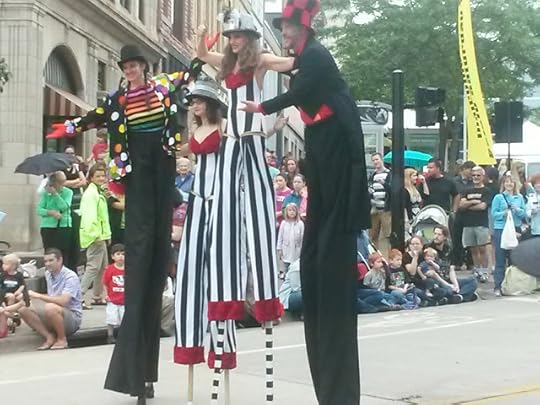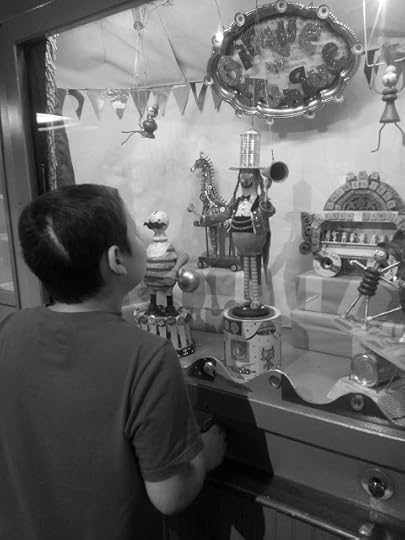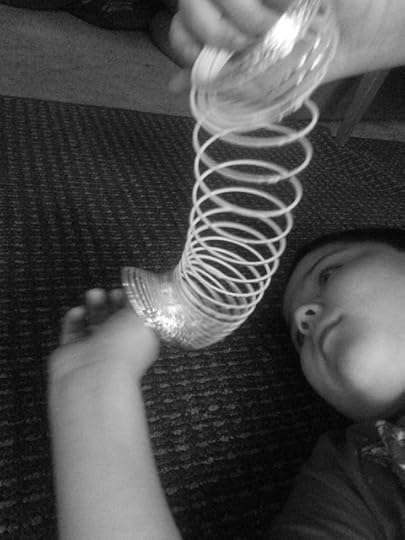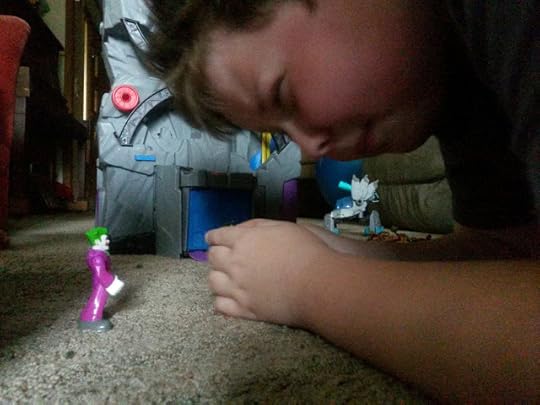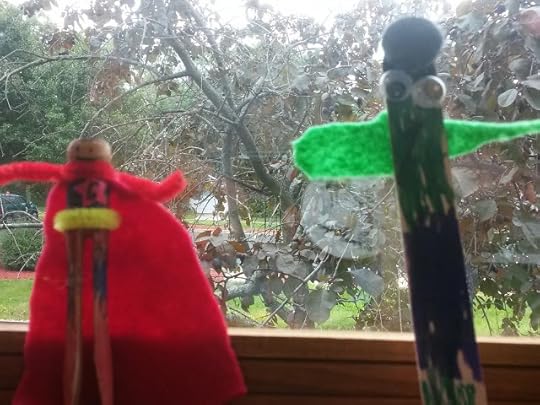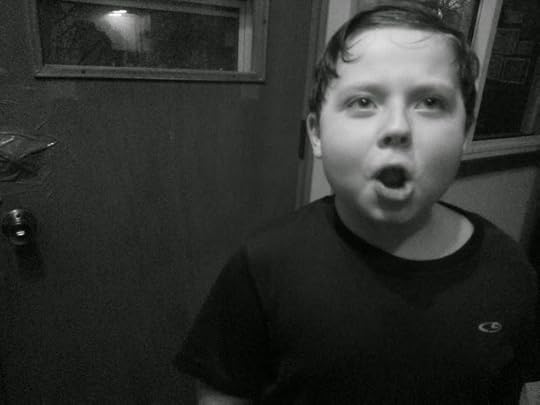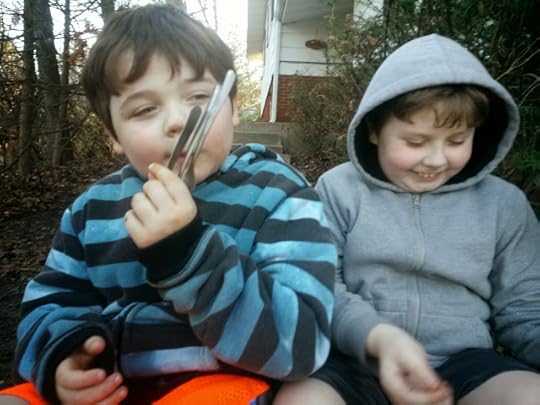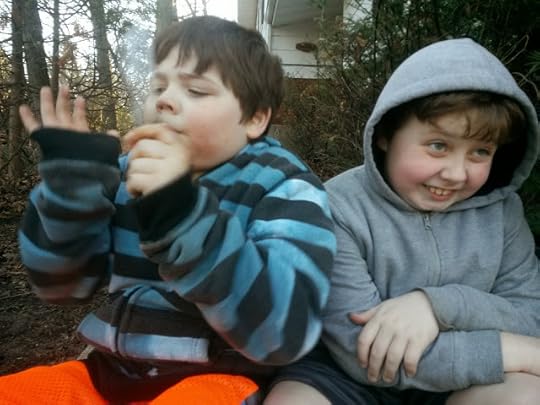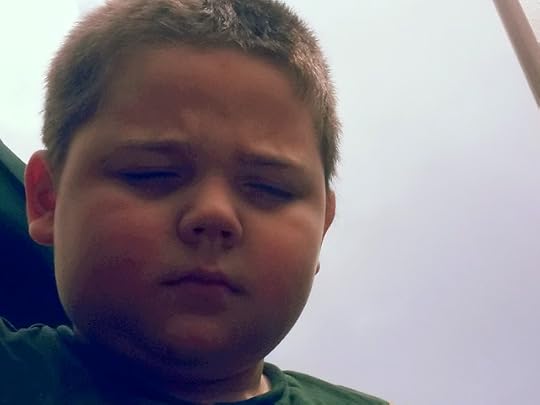Briane Pagel's Blog: Thinking The Lions, page 23
January 8, 2016
Castles Famous People Own, 1
“Manderley Castle,” Killiney, Ireland:
1. Enya added 4 feet of height to the wall when she moved in.2. She bought it out from under Michael Flatley, who was “also interested.”3. Previously called “Ayesha Castle,” named such after a character in the 1886 serial story “She,” the character in question being “She-Who-Must-Be-Obeyed.” This story is credited with being the inception of “Lost World” stories.4. “Enya” is actually spelled “Eithne.”5. My favorite Enya song is “Storms In Africa.” :0_______________________________________

1. Enya added 4 feet of height to the wall when she moved in.2. She bought it out from under Michael Flatley, who was “also interested.”3. Previously called “Ayesha Castle,” named such after a character in the 1886 serial story “She,” the character in question being “She-Who-Must-Be-Obeyed.” This story is credited with being the inception of “Lost World” stories.4. “Enya” is actually spelled “Eithne.”5. My favorite Enya song is “Storms In Africa.” :0_______________________________________
Image credit: “Killineycastle” by Brian Honne at en.wikipedia. Licensed under CC BY 3.0 via Commons -
Published on January 08, 2016 04:54
January 7, 2016
10 MORE minutes ranking and discussing the books I didn't finish reading in 2015
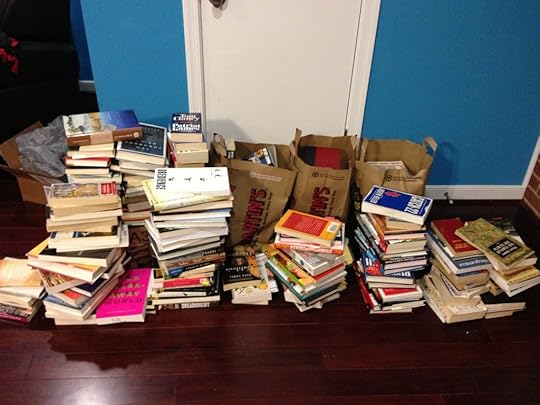 Last time I counted down from 36-31 the books I read in 2015; those were all books I didn't even bother finishing because they were so bad. All in all in 2015, I tried to read and/or completely read about 40 books, and then ranked them from 1-36.
Last time I counted down from 36-31 the books I read in 2015; those were all books I didn't even bother finishing because they were so bad. All in all in 2015, I tried to read and/or completely read about 40 books, and then ranked them from 1-36.It's not 1-40 because I listed all the books I could remember reading or find in my Kindle history, then numbered/ranked them. Then I added books that I remembered and renumbered and reranked. Then I thought of more and renumbered again, so on round four I just added the ones in and made them numbers like "26A," as you'll see below.
We're still on book I didn't bother finishing reading, beginning with
30. Stone Mattress: Nine Tales, Margaret Atwood: Margaret Atwood gets a lot of praise, and most of her books just sound unappealing to me. I finally decided to try this one, because I like short stories. I got through the first one, I think. Maybe I got mostly through it. I'm pretty sure it was about an old lady and her husband who is a ghost. Either way it was a plodding and dull story. I didn't care about the old lady. I wasn't interested in finding out why her husband was a ghost, if he was. The book wasn't aggressively trying to put me off, the way David Foster Wallace used to. It was more that reading it felt like a chore, like when I try to read articles about the deficit or Syria, not because I want to but because I feel like I ought to. I doubt I'll be trying any more Atwood stories anytime soon.
29. The Uncoupling, Meg Wolitzer. I already discussed this bomb, here. I only ranked it this high because the others were so much worse; at least on this one I got about 4/5 through it, although mostly that was because (as I said in that earlier post) it was the only thing I had to listen to on a day of long driving.
 28. The Bees, Laline Paull: This really was disappointing. I remember when this book came out and I thought it sounded great -- a book told from the perspective of a bee, but not a humanized bee like in the cartoons. It was supposedly a major triumph of storytelling or something. The concept itself is okay; the book begins with the main character hatching and has some interesting bits in it, but I just couldn't get into it. There didn't seem to be any energy to the story. I went back to this one two or three times because I really wanted to like it, but it never took, so a chapter or so in I gave up.
28. The Bees, Laline Paull: This really was disappointing. I remember when this book came out and I thought it sounded great -- a book told from the perspective of a bee, but not a humanized bee like in the cartoons. It was supposedly a major triumph of storytelling or something. The concept itself is okay; the book begins with the main character hatching and has some interesting bits in it, but I just couldn't get into it. There didn't seem to be any energy to the story. I went back to this one two or three times because I really wanted to like it, but it never took, so a chapter or so in I gave up.27. To Rise Again At A Decent Hour, Joshua Ferris: I bought this book on sale from Amazon, and it was the last book I actually purchased. Every book I've read since then has been borrowed from the library or given to me as a gift. I think this book might have been the reason I became so leery of buying books. It was only $2.99, and that low for a reason. It's not very compelling. And it should be! It's about a dentist who suffers insomnia and who finds out, unrelatedly, that someone has created a whole Web presence for him of a vaguely biblical nature. The guy himself is a sort of determinedly antisocial man who got that way because he was so desperately bad at being social. It has all the elements I should like, but never put them together in any way that mattered to me. I still have it on my Kindle and every now and then think I should go read it some more but then I think eh and go on with my life.
26. The Goldfinch, Donna Tartt: Another one I mentioned here, and I just saw when I checked out that link that I also didn't finish Funny Girl by Nick Hornby so let's make that 26B.
The Goldfinch when I mentioned it in October was one I'd just started, and looking back to that post I can see I was still kind of excited about it. I'm not sure what went wrong. In the book [SPOILER ALERT] the boy who steals the painting goes to a museum with his mom. There's some sort of bombing and the boy barely survives, taking the painting in the process. His mom dies, and his dad isn't really in the picture. Through all that I was liking the book. The boy goes home from the museum, just wanders away with nobody knowing he was in there (but it's done believably) and the book up to that point is really very good. The rest of that day and night are very touching and sad, as the boy relates what happens. Then there is this longish part where he stays with a friend and my interest just waned. I don't know. Maybe it was that I had other stuff going on or something. It just felt like one day I didn't want to go on reading. Possibly the staying-with-a-friend lost steam or something. I just sort of dropped the book and can't really explain why, but when I saw it was available at the library again I thought about trying again, and my mind sort of went Oh no here we go again so I didn't check it out.
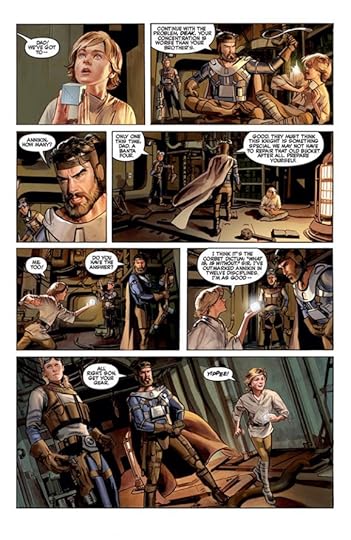 26A. The Star Wars, J.W. Rinsler (and George Lucas): This one was actually a comic book version of what I guess was the original draft script for Star Wars. It's really different than the movie turned out to be: Han Solo is an alien, Vader doesn't have a helmet, there are a lot more Jedi, Leia is a bratty teenager. It's got the Empire, and invasions and some good fights, including one on the Wookie planet. I was slowly working my way through it, reading it here and there -- I had it as a physical book I checked out of the library. Right after Xmas, my time expired and I couldn't renew it, because someone else had put a hold on it. So I took it back having read about 2/3 of the way through. It wasn't too bad, but wasn't worth me putting a hold on to finish. Mostly it was kind of an interesting exercise, seeing how much of the very first part of the idea of Star Wars made it into the final movies, and in what form: there were lightsabers, but everyone had them, for example. There was no Millenium Falcon -- at least not at the point where I got through. And I hadn't yet found Chewbacca. C3PO was a female robot, and Artoo Detoo could talk in regular human language; they seemed to both have the personality of the movie's C-3PO. If you like Star Wars it's worth trying to find.
26A. The Star Wars, J.W. Rinsler (and George Lucas): This one was actually a comic book version of what I guess was the original draft script for Star Wars. It's really different than the movie turned out to be: Han Solo is an alien, Vader doesn't have a helmet, there are a lot more Jedi, Leia is a bratty teenager. It's got the Empire, and invasions and some good fights, including one on the Wookie planet. I was slowly working my way through it, reading it here and there -- I had it as a physical book I checked out of the library. Right after Xmas, my time expired and I couldn't renew it, because someone else had put a hold on it. So I took it back having read about 2/3 of the way through. It wasn't too bad, but wasn't worth me putting a hold on to finish. Mostly it was kind of an interesting exercise, seeing how much of the very first part of the idea of Star Wars made it into the final movies, and in what form: there were lightsabers, but everyone had them, for example. There was no Millenium Falcon -- at least not at the point where I got through. And I hadn't yet found Chewbacca. C3PO was a female robot, and Artoo Detoo could talk in regular human language; they seemed to both have the personality of the movie's C-3PO. If you like Star Wars it's worth trying to find.You can see how the books are getting a bit better -- the last one I only didn't finish because of library deadlines. A couple others were maybe worth finishing. The next installment will begin with books I actually did finish.
Published on January 07, 2016 18:05
2015 In Pictures: June and July
Published on January 07, 2016 08:02
January 6, 2016
Things You Probably Don't Think About, But We Have To, 1:
Every school day, we wait outside for the bus. We go outside at exactly the same time, or as close to it as we can. Mr Bunches positions himself in a spot about 2/3 of the way down the driveway: this is where he can see just over the bushes in our yard to the top of the hill, where he can first see the bus when it turns the corner.
This is important to Mr Bunches. He has nightmares sometimes of missing the bus. He actually wakes up crying every so often, telling us that he dreamed he missed the bus. Even if we tell him that won't happen, that the bus driver would wait for him, it doesn't help him.
So he stands every morning watching for the bus so he can make sure he doesn't miss it.
Except this morning.
This morning, the neighbors had a truck parked in their driveway:

"I can't see the bus," Mr Bunches reported.
I suggested he move a little closer to the road, but the road is "dangerous."
In the end, I had to stand at the end of the driveway, between him and the road, to keep a watch for the bus.
So that he wouldn't miss it.
This is important to Mr Bunches. He has nightmares sometimes of missing the bus. He actually wakes up crying every so often, telling us that he dreamed he missed the bus. Even if we tell him that won't happen, that the bus driver would wait for him, it doesn't help him.
So he stands every morning watching for the bus so he can make sure he doesn't miss it.
Except this morning.
This morning, the neighbors had a truck parked in their driveway:

"I can't see the bus," Mr Bunches reported.
I suggested he move a little closer to the road, but the road is "dangerous."
In the end, I had to stand at the end of the driveway, between him and the road, to keep a watch for the bus.
So that he wouldn't miss it.
Published on January 06, 2016 05:31
January 5, 2016
The Story of The Trains, By Mr Bunches (Art By Daddy)
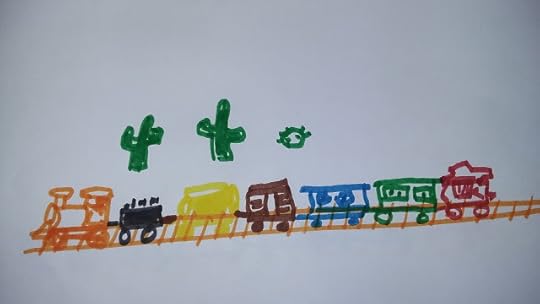
This is the good train. It is driven by the sheriff.
It has an engine, a coal car, a tanker car,
a box car, and passenger cars.
Last but not least is the caboose. With Mommy and Daddy.
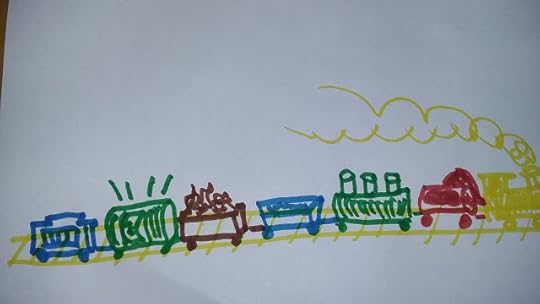 This is the bad train. It has an engine,
This is the bad train. It has an engine,a lava car, a pipe car, a tar wagon,
a fire car, a smelting car,
and a blue caboose.
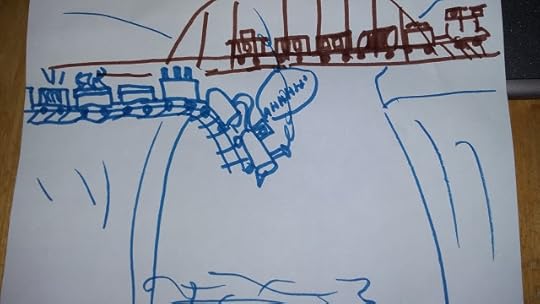 The sheriff switched the lever and exploded the bridge.
The sheriff switched the lever and exploded the bridge.Then the bandit falls into the river.
The good train lives.
The bandit says Ahhhhhhh!
The end.
Published on January 05, 2016 16:28
January 4, 2016
2015 In PIctures: March, April & May
Published on January 04, 2016 18:33
January 3, 2016
Book 2 of 100: "Dept. of Speculation" is about the stories we tell ourselves, about ourselves.
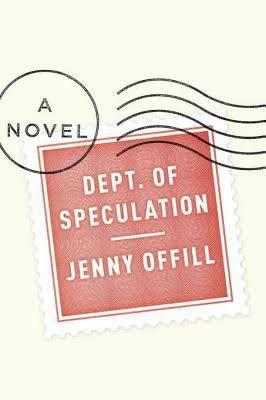 ARRRGHGGHGHGHGH!
ARRRGHGGHGHGHGH!This is the second time I am writing this post -- the third if you consider the fact that I first wrote it, then revised it after thinking about it a bit, and then sat down to put the final touches on it only to decide to undo something I pasted in and delete the entire post.
That is the least poetic way I can think to introduce book number 2, and trust me when I say that the earlier version of this post was better. But maybe the way this post is coming about is actually a more accurate way to discuss Book 2, Dept. of Speculation.
As the post title says, Dept. of Speculation is about how we tell our own stories -- to ourselves, to others, to the world. All of our lives are really just an autobiography, after all, and we pick and choose what to let others see, constantly culling and editing our thoughts and the way we present ourselves to the world as we decide how our story will go.
The thing is, we are only remotely in control of our stories, anyway. I wrote a comic that talked about free will a while back, and in it I pointed out that even the free-est of wills is only so free, because each choice we think we get to make is the product of a billion billion other choices over the history of the universe -- so how free are we?
Dept. of Speculation presents a similar worldview, while allowing for the idea that we can at least sometimes change our lives by presenting them in a different way. The story is told from the point of view of the wife in a marriage that becomes troubled. It's told in an almost first-person-plus, as we're directly inside her head with little to no mediation: her thoughts come in a stream-of-consciousness, rarely describing the world directly: there's not much in the way of descriptions of scenes or people, and lots of talk about thoughts and feelings and actions and reactions.
This makes sense: how often do you walk into a room and think There's a yellow chair over there, with a tall handsome man standing by it. He's holding a red glass..? Never. So for true first-person, you've got to immerse yourself in the person's head the way they really think, and Jenny Offill, the author here, does that brilliantly: the story jumps in fits and starts, and people are referred to by nicknames, and there are snippets of quotes that the narrator remembers, places where her mind wanders, and more. Done badly, this would be horrible. It's done beautifully here, and the world we get to walk through is real to the point of painfulness, while maintaining a kind of dreamlike quality somehow.
As the story unfolds, the narrator begins to relate troubles in the marriage even before we get to the big one: there is a miscarriage, and neighbor problems, and an episode with bugs or lice (it wasn't clear what), and all these little battles play out on the field of the narrator's mind, until the big one comes, and she finds out that her husband has been having an affair.
Even that is revealed almost obliquely, as it unfolds in the book -- the narrator never thinks he told me he was having an affair. She just relates the exact sequence of questions and answers that lets the answer be known, and we have to almost read between the lines to figure out what's going on.
It feels exactly like how I think, and how I imagine everyone thinks -- although we can never really know if anyone else's mind works like ours.
The idea that this person is telling us a story is driven home in part by a shift in the focus: at the beginning the narrator speaks in the second person -- you, sometimes seeming to refer to herself, sometimes to her husband. At one point in the book she suddenly begins referring to herself as the wife, and the distance between her and her life becomes more apparent. Then, in a scene in which she confronts the other woman, the narrator pulls back even more -- recalling the episode and imagining what she would have done if one of her students had written such a scene, how she would have made it more believable and less pitiable.
That's not actually the best part of the story. There's a heartbreaking night at a Holiday Inn Express, when the narrator flees the house after a fight. Later on, as they attempt to reconcile, the narrator and her husband drive by a different Holiday Inn Express, and the narrator mentions that the worst night of her life was spent there. The husband doesn't know what she's talking about -- and how could she? She hasn't told him that story yet.
The book ends, but the story doesn't -- it doesn't resolve in any definitive way, another thing that made the book feel real. Our own stories don't resolve; even when a given episode ends we are just in our same lives, moving forward, trying to fit the latest events into a larger framework, deciding what to keep and what to delete and what to modify.
Because we do modify our stories. The wife in Dept. of Speculation lets us see inside her head, the way her story actually unfolds and what she lets people know, how she changes things when she relates them, how she alters her own perception of things. In retelling others about ourselves, in describing our day or telling someone about a confrontation or mentioning a piece of news, we edit the scenes down, present them in an order that makes sense, culling out details we think are unimportant but which might be more important, not saying everything we think or everything we feel. Dept. of Speculation shows us our own thoughts in a mirror.
I listened to this book mostly while driving Mr F around. He likes to go for rides in the early morning or late at night. We drive mostly the same route, through an industrial park and then back through downtown and then the suburbs. There usually isn't much traffic, and Mr F doesn't talk. He likes to roll down the window and hang his hands out. It leaves me a lot of time to think, to look back on my life and look forward, to mull over the events of the day and my various thoughts, to plan and feel and just be with my own mind. It lets me make sense of my own story, without having to have other people looking at me or asking me about it, put everything in order.
We can never really know what's going to happen next. We are all in possession of things that were destroyed before they began: hoped-for dates that never panned out, children that were never born, vacations that had to be canceled. We also have a whole trove of memories -- stories, memories are stories -- that we didn't ask to live through. Arguments and deaths and accidents and other traumas, sometimes brought on by ourselves and sometimes driven into us by others. We have things go wrong and things go right, both accidentally and on purpose. Things don't turn out the way we imagined them to.
And through it all, we are editing, revising, culling, cutting, reshaping: we are deciding what to remember and what to let go, how to describe it, who to tell it to, what parts to play up, what parts to gloss over. Our lives are only based on actual events, in the end. If I hadn't told you that this was the third time I wrote this post, would you have guessed? By providing you that information, I gave you a version of myself that I chose to present. I didn't have to do that. I could've just reposted this and left out the part where I messed things up. That wouldn't have been a lie, but it wouldn't have been the truth, either.
I used to debate a friend about whether anything was actually true, about whether any story could be considered true, given that we are imperfect creatures who tell partial stories. He thought they could be, that stories about our lives could be true.
In Dept. of Speculation, the wife thinks the truth, but even then, we can't be sure it's the truth. She sees her husband as this good-natured, always positive, almost pollyannish blonde midwesterner -- but he had an affair on her. He's not so good-natured. She comes to realize that her daughter, too, is someone she can barely understand, and her daughter's only six. At the end of the book her daughter is wrapped up in a game, moving rocks around the yard. She won't tell her mom what the game is, and the mom has to guess. The gulag game, she names it -- imagining that her six-year-old daughter is able to construct a prison and make a game of it. She doesn't know, and her daughter won't say.
I spend a lot of time thinking about how we remember things and how we talk about them. I think about Mr F, who doesn't tell us any story about himself, really -- and so we have to make one up for him. When he cries we have to try to imagine what's upsetting him. We took a ride today, and rather than go on his regular route, I thought he'd enjoy driving down by the Capitol, through the campus. But about 10 minutes into it, he got angry: he bit at his seatbelt and clapped his hands to his head and bounced around and made angry noises. I turned around, and drove back to his regular route. He seemed to calm down then, once we were back heading to the industrial park.
"He didn't like the ride," is the story I told Sweetie. My story, it was. I left out the part where we drove to the edge of the lake to see if it was freezing up yet; I didn't mention how I decided that Mr F might like the new ride in part because I wanted to try a new ride, rather than do the same ride for the fourth time that day. And who knows what the real thing was? Maybe Mr F didn't like that part of the book that we were listening to? Maybe he was just crabby? Maybe he really didn't like the new ride.
Dept. of Speculation is remarkable not just for the narrator, and not just for the unique way it tells the story. It's worth reading because it makes you think, and that's a mighty, rare thing.
Published on January 03, 2016 18:25
Book 1 of 100: Jonathan Lethem's short stories mostly disappoint.
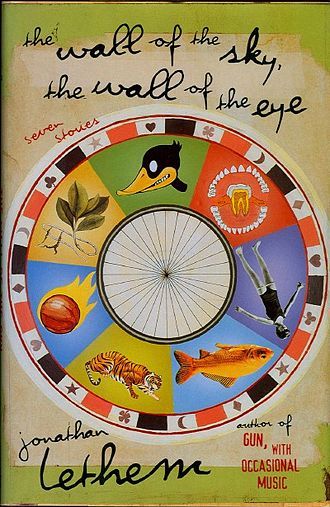 I finished the first book of the 100 today. It was The Wall Of The Sky, The Wall Of The Eye, by Jonathan Lethem. It's a collection of short scifi stories that I almost didn't finish it at all, because of the first two stories and the first half of the third.
I finished the first book of the 100 today. It was The Wall Of The Sky, The Wall Of The Eye, by Jonathan Lethem. It's a collection of short scifi stories that I almost didn't finish it at all, because of the first two stories and the first half of the third.I had read through the first two stories, and found them disappointing: they were about on the level of a 9th-grade English student's sci-fi stories. The first one in the collection is The Happy Man, and it starts off promisingly enough with the narrator being a guy who died but for financial reasons his wife had him resurrected, so now he spends some time in life and some time in his own personal Hell. That he went to Hell is presented matter-of-factly, like everybody goes there. The man's hell is also unusual, involving a witch's breakfast, the robot maker and "The Happy Man," but where the story falls apart is in the trite, twisty-ending that I saw coming as soon as a certain character was introduced. Lethem also tries hard not to broadcast the ending by having the narrator repeatedly say that his Hell is not symbolic of anything in his life.
The second story also began with a pretty neat idea: it's the future, and basketball players are fitted with exosuits that allow them to play with the skills of some basketball great. The story picks up where a hotshot white kid has just been drafted as a rookie with Michael Jordan's skills, and one of the main characters is African-American and is offended that a white kid with seemingly no knowledge of basketball history gets Jordan. But from there, the story just became a sort of exegesis on basketball; something like 75% of the story is taken up in detailing -- with great detail -- a particular game. In the end, the story wrapped up with another twist-type ending (even good writers should try not to have twist endings. They're too hard to work into a story in anything but a clumsy manner. So that makes two things no writer should ever use: 9/11, and twist endings.).
It was the third story that almost made me quit -- two guys rob a drug dealer to get money to go to California to try to clean up. It was about as basic a version of that premise as you can get, and midway through the story I took a break to run some errands with Sweetie. I was telling her how disappointing the stories were, and said I might quit reading. We got home and were going to eat lunch and I was about to close out of the book when my eye fell on the word alien. I'd just gotten to the scifi premise of the story, where these aliens called "Sufferers" were introduced. "Sufferers" are aliens that follow people around just before something bad is going to happen to them; they're indestructible and silent, mostly.
The appearance of the Sufferer ultimately, though, proved to be meaningless in the story, and I would've given up on the book then, but I kept reading. I'm not sure why. I think there was enough promise in those first three stories to give it another try.
The next one, "Forever, Said The Duck," was better: a party made up (apparently) of computer-program versions of people a couple had met. It didn't really have any point that I could discern, and felt like maybe an encapsulation of a longer story, but at least it was interesting and not trite.
The real gem was the story "Five Fucks," which is unnecessarily vulgar, but a fantastic story: A woman meets a man and has sex with him, only to find out that she's lost two weeks of her life. She goes to confront the man and realizes that she can't live without him, even though he tries to warn her away. From there, the remaining four meetings have increasingly more bizarre effects, and the ending was one of those jaw-dropping endings that make you realize you've just read something completely original and amazing. It's what I expected more of these stories to be.
"The Hardened Criminals" also rose above the rest; not as good as Five Fucks, but clever and interesting: A man gets sent to a prison built of bricks made out of career criminals; the prisoners who are bricks are still alive somehow, and can talk and see but can't do anything else. It's a bizarre and frightening setup that doesn't pay off, but the story is still okay.
The final story, "Sleepy People," fell back into the mold of "clever idea with no reason for existing." A woman finds a man asleep on her porch, and it turns out that the man is a "sleepy person," which people say can cause plants to grow. It's never explained why there are Sleepy People or what they do otherwise, which I'd've been fine with if there was a story around it, but "Sleepy People" felt more like an outline of a longer story, or excerpts from one: there is a militia at the local bar (with no explanation ever of why there would be a militia), and people called "dinosaurs" that do home invasions (with no apparent reason for being called "dinosaurs.") The whole story feels maybe like an intro to a novel set in that world, except for the very-hurried and otherwise pointless home invasion that doesn't amount to much.
One thing I keep coming back to as I read new books is my thinking Why does this story exist? As I've said before, it's not like every story has to have a theme or message or be symbolic. But if I am reading something and I start to wonder why it exists, that's a bad sign: it means my mind is wandering as I'm reading, so an activity that is almost completely in my mind isn't even occupying much of my mind. I've read books that are so good (Salvage The Bones was the most recent) that I never stop to think why does this story exist. I think why does this story exist is a broader, harsher version of why am I reading this? It's not just that I don't like it, but that I don't like the story so much that I can't imagine the world needing it. At least two of the stories in this book -- Vanilla Dunk, (the basketball one) and Light, And The Sufferer (the drug-dealer one) were why does this story exist types of stories.
Overall, Lethem is a good enough writer that even pedestrian stories aren't bad to read. But I got the feeling these stories were only published into a book to try to get readers to buy something. This book was the third one Lethem published, after Gun, With Occasional Music, which got him a lot of acclaim, and Amnesia Moon, and it feels like it was sort of forced, as though Lethem's publisher was pressing him to publish something so he pulled out a bunch of junk he had laying around. He should've taken these ideas and either fleshed them out into good stories with a reason for existing, or just abandoned them and incorporated the ideas as bit players into some other book.
___________________
Published on January 03, 2016 05:50
January 2, 2016
100 Books: The beginning
 I don't go in for New Year's resolutions. When I think of something I want to do I just start doing it, rather than waiting for January 1 to try to achieve something.
I don't go in for New Year's resolutions. When I think of something I want to do I just start doing it, rather than waiting for January 1 to try to achieve something.But last week I was listing all the books I've read this year to do a ranking of them, and I realized I'd read a lot of books last year. It got me to thinking. I said to Sweetie "Do you think I could read 100 books in a year?"
"Sure," she said because Sweetie believes in me, which is both gratifying and requires that she ignore 19 years of knowing me.
So I thought about it a few days and today was doing the math: I'd have to read a book every 3.65 days, or two books a week. That's a pretty big task.
I decided to try it. I spend a lot of time frittering around on the Internet, and I sometimes feel like I'm wasting my time on it, just reading stuff that I won't even remember later. So if I were to use that time to read a book instead, I figure I could do it.
So that's what I'm going to do this year. Hopefully it will work out better than my ill-fated quest to do 2,014 pushups in a single year a few years back. At least this one shouldn't set off an asthma attack. *crosses fingers, throws salt over his shoulders.*
I'll list the books and talk about them as I finish them. If you want to join me in this, let me know in the comments and talk about it on your own blog, and we can all help each other. Also, Andrew Leon will probably read 100 books in the first week.
Published on January 02, 2016 17:40
If your decision to vote for someone depends in any way on who they root for in college football then you don't deserve the right to vote.
Carly Fiorina is a Stanford graduate who ran Hewlett-Packard into the ground and was rewarded with $42,000,000 in severance pay. On Friday she tweeted this:
Love my alma mater, but rooting for a Hawkeyes win today. #RoseBowl— Carly Fiorina (@CarlyFiorina) January 1, 2016Carly Fiorina figures Iowans are dumb enough to vote for her based on who she claimed to be rooting for in a college bowl game.Oh,, and Hewlett-Packard still pays her $200,000 a year in pensions. One-half of Iowans make under $51,000 a year. That's actually among the highest median incomes in America.
Published on January 02, 2016 04:05
Thinking The Lions
Do you think people invented "Almond Joy" and then thought "we could subtract the almonds and make it a completely different thing?" or did they come up with "Mounds" first and then someone had a brot
Do you think people invented "Almond Joy" and then thought "we could subtract the almonds and make it a completely different thing?" or did they come up with "Mounds" first and then someone had a brother-in-law in the almond business? And anyway did you ever notice that the almond creates a little mound and that "Mounds" are flat?
I'm probably overthinking this. ...more
I'm probably overthinking this. ...more
- Briane Pagel's profile
- 14 followers
















